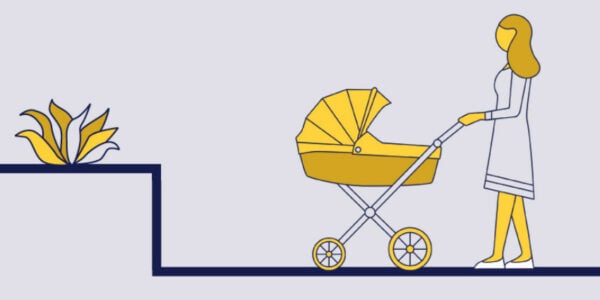About
This summary highlights the main findings of Born into Care: Newborn Babies in Urgent Care Proceedings in England and Wales—a report commissioned by Nuffield Family Justice Observatory and undertaken by the Family Justice Data Partnership, which is a collaboration between the University of Lancaster and the University of Swansea.
The report provides updated data and analysis on:
- the number and incidence rate of newborn babies and infants in care proceedings at national and regional level
- the proportion of urgent interim care order (ICO) hearings involving newborn babies that are held at short notice (defined in the report as within seven days), as an emergency (less than three days), and on the same day (with zero days’ notice)
- the number of emergency protection orders (EPOs) made for newborn babies and infants, and the proportion of these cases that progress to s.31 proceedings.
The report and summary cover the period 1 April 2012 to 31 March 2020.
Introduction
When a local authority issues care proceedings under s.31 of the Children Act 1989, a request can also be made for an urgent interim care order (ICO) hearing. Cafcass distinguishes between short-notice hearings (within seven days), emergency hearings (less than three days) or same- day hearings (zero days’ notice), which all follow swiftly after the issue of care proceedings. The consequence of requests by the local authority for an urgent hearing are that this limits the time available for the children’s guardian (Cafcass and Cafcass Cymru) to appraise the case and can also compromise parents’ Article 6 rights under the Human Rights Act 1998, allowing insufficient time to instruct a solicitor. Such concerns are even more acute in relation to newborn babies and their mothers.
Although urgent action following the birth of a new baby can be both necessary and proportionate where there is an immediate need to safeguard the baby from harm, there has been widespread concern that the volume of these cases is increasing. This concern has been set out by the President of the Family Division’s Public Law Working Group for England and Wales in recent reports (PLWG 2019; 2021). The PLWG also expressed concern that some infant care cases were being issued on an urgent basis because of insufficient planning and preparation in the pre-birth period. Hasty decision-making can overlook family carers, which can result in unnecessary separation or placement moves.
The PLWG—which has an overarching aim to ensure that, wherever possible, infants and children can remain safely within their family networks, reducing the need for intrusive family court intervention—has set out recommendations that aim to improve pre-proceedings (pre- birth) practice and which require that the grounds for an urgent ICO hearing are made clear to the family courts in all cases. As the PLWG moves forward to implement recommendations from its most recent report, the data analysis provided in the latest Born into Care report provides important benchmarks against which progress can be measured.
This report provides new evidence about the number of newborn babies and infants in care proceedings in England and Wales, as well as the frequency of urgent hearings in these cases. 1 New evidence is also provided about the use of emergency protection orders (EPOs). Analysis of infant cases is based on data collected by Cafcass and Cafcass Cymru in the eight-year period between 2012/13 and 2019/20 (fiscal years). 2
Children and Family Court Advisory and Support Services (Cafcass) categorisations
In cases where local authorities require swifter decision-making following the issue of care proceedings, an application can be made for an urgent interim care order (ICO) hearing. Cafcass offers the following categorisation of these hearings:
- short-notice – first hearing takes place less than seven days from the care application issue date
- emergency – first hearing takes place less than three days from care application issue date [Note that the research in the report measures one or two days]
- same-day (zero days’ notice) –first hearing takes place on the day the care application is issued.
Key findings
- In England, the average number of infants in care proceedings between 2012/13 and 2015/16 was 5,305 per year, compared to 5,899 per year between 2017/18 and 2019/20. In Wales, the average number of infants in care proceedings per year was 366 between 2013/14 and 2015/16, compared to 455 between 2017/18 and 2019/20.
- The number of newborn babies in care proceedings in England increased from 2,425 in 2012/13 to 2,914 in 2019/20. In Wales, numbers increased from 145 to 241 over the same period, although falling to 203 in 2019/20. Newborn babies account for a growing proportion of cases relating to infants—just over half of them in 2019/20.
- The rate (incidence) of newborn babies in the general population subject to care proceedings has also increased when we measure the number of newborn cases per 10,000 live births in England and Wales (see Figure 1). In 2019/20, 47.7 newborn babies per 10,000 live births were subject to care proceedings in England, up from 34.9 per 10,000 in 2012/13. In Wales, the rate is even higher—68.3 per 10,000 live births in 2019/20, up from 41.1 in 2012/13.
- In 2019/20, 86.3% of cases involving newborn babies in England and 74.8% of cases involving newborn babies in Wales were heard at short notice (under seven days)—the majority of which on an emergency basis, with between just one and two days’ notice.
- In a sizeable and growing proportion of newborn cases in both England and Wales, the application is issued and the first hearing is scheduled the same day, with zero days’ notice (see Figure 2). In 2019/20, approximately one in every six newborn babies in care proceedings was the subject of a same-day hearing.
- Incidence rates clearly vary by region.
- London differs very significantly from both Wales and many regions of England, particularly, the North West, North East, and Yorkshire and the Humber. It has the lowest incidence rates (24.9 newborn babies per 10,000 live births in 2019/20), and both London and the South East have the lowest proportions of same-day hearings (9.3% and 11.4% respectively). Practitioners contributing to earlier research suggested that the greater availability of preventative services in London, such as mother and baby placements and the quality of legal advocacy, had resulted in fewer infant cases being issued at birth (Mason and Broadhurst 2020).
- At the opposite end of the spectrum is the North East, where incidence rates have doubled over the last eight years, increasing from 34.0 per 10,000 live births in 2012/13 to 83.1 per 10,000 in 2019/20. Over time, the proportion of same-day newborn cases has also doubled in the region (to 41.3%)—by far the highest rate across England and Wales.
- In Yorkshire and the Humber, although the proportion of same-day hearings is lower than in the North East, at 26.8% in 2019/20, it is growing and higher than the national average (see above).
- There are marked similarities between Wales and the North West of England in terms of incidence rates—68.0 and 66.2 newborn cases per 10,000 live births in 2019/20 respectively. Alongside the North East, and Yorkshire and the Humber— and unlike other regions of England—Wales evidences a statistically significant upward trend in the proportion of hearings scheduled with zero days’ notice.
- In England, infants are more likely to be subject to applications for an emergency protection order (EPO) than older children.3 Both infants and older children who had been the subject of an EPO application were highly likely to appear as subjects in care proceedings within a 28-day period (or within the same case). Between 2012/13 and 2019/20:
- 86.1% of all cases subsequently recorded a s.31 application
- 89.0% of cases involving a child under a year old subsequently recorded a s.31 application
- 90.4% of cases involving a newborn baby subsequently recorded a s.31 application.
These data findings refute concerns that children who appear in EPO applications do not subsequently appear in care proceedings.
- Overall, however, most infants and children do not start their journeys through the family justice system because an EPO application has been made. Regarding all children, only 6.5% of all cases for care proceedings were preceded by an EPO, and in the case of newborns the frequency was equally low at 7.7%.
Sample size, data gaps, and limitations
The primary source of data was electronic case management data produced routinely by Cafcass and Cafcass Cymru. All cases of s.31 care proceedings that started between 1 April 2012 and 31 March 2020 (fiscal years) were included (47,955 infants, including 21,774 newborn babies). Data relating to EPOs in England includes all s.44 applications over the same period (13,119 children, of whom 3,652 were infants, including 1,731 newborn babies). While both Cafcass and Cafcass Cymru record all cases of s.31 care proceedings, they are not involved in the voluntary accommodation of children under s.20 of the Children Act 1989 or s.76 of the Social Services and Well-being Act (Wales) 2014, and therefore do not capture this data.
Relevant case information for this study included: child’s week of birth, date of issue, and date of the final order for all s.31 (care and supervision) cases, date of first hearing (following the s.31 application issue date), and local authority. Administrative data was made available by the SAIL Databank at Swansea University (Ford et al. 2009).
We were not able to access police protection data, although emergency action can be taken by the police using their powers under s.46 of the Children Act 1989.
Recommendations
- If same-day or emergency hearings are now the norm in newborn care cases in England and Wales, then this suggests that wholesale review is needed of how care proceedings are conducted at birth. It significantly compromises parents’ Article 6 rights, and short-notice action is also not in the best interest of infants where there has been insufficient placement planning. Many of the important recommendations set out in the final report of the PLWG— including better and more timely use of pre-proceedings/Public Law Outline (PLO), a new information form that requires the grounds for an urgent ICO hearing to be made clear, early notice to Cafcass and Cafcass Cymru pre-birth, and a review of parents’ access to legal advice pre-proceedings—may deliver improved practice, enabling more timely and inclusive decision-making for infants and parents, where they are sufficiently implemented. But further consideration needs to be given to parents’ ability to meaningfully participate in the immediate postpartum period.
- We would recommend further examination of local area practice in order to better understand the distinct regional variations in the data.
- Although urgent decision-making for newborn babies can be both necessary and proportionate, the rising number of same-day hearings is particularly concerning in the North East and noteworthy in Yorkshire and the Humber. A number of interrelated factors are likely to be at play, including the level of poverty, the availability of services to support vulnerable mothers and babies, and hospital discharge policies. A comparison of local authorities with similar demographic profiles, but very divergent use of urgent hearings, would throw light on the drivers of urgency and what might be done to bring proceedings to court in a more planned and inclusive way.
- Given the historically high incidence rates in Wales, the 2019/20 drop should be monitored and investigated further. As the reduction only applies to a single year we cannot say decisively that new preventative projects are reducing the need for infant removal, but it will be important to investigate this relationship further, over time.
References
Ford, D.V. et al. (2009). The SAIL Databank: building a national architecture for e- health research and evaluation. BMC Health Services Research 9 (1) p.157.
Mason, C. and Broadhurst, K. (2020). Discussion paper: What explains marked regional variations in infant care proceedings. London: Nuffield Family Justice Observatory.
Public Law Working Group. (2019). Recommendations to achieve best practice in the child protection and family justice systems. Interim report. Available from: https://www.judiciary.uk/wp-content/uploads/2019/07/Public-Law-Working-Group-Child-Protection-and-Family-Justice-2019-1.pdf [Accessed 13 April 2021].
Public Law Working Group. (2021). Recommendations to achieve best practice in the child protection and family justice systems. Available from: https://www.judiciary.uk/publications/message-from-the-president-of-the-family-division- publication-of-the-presidents-public-law-working-group-report/ [Accessed 13 April 2021].
1 In the report, the term ‘infants’ applies to children under 52 weeks old and the term ‘newborn’ applies to babies under two weeks old.
2 Note that the report covers the eight-year period to 31 March 2020 and is therefore broadly ‘pre-COVID’.
3 While Cafcass Cymru routinely captures data on EPOs in Wales, numbers are too small to enable meaningful statistical analysis.
Organistions
-
 Lancaster University
Lancaster University -
 The Centre for Child and Family Justice Research
The Centre for Child and Family Justice Research -
 Population Data Science at Swansea University
Population Data Science at Swansea University -
 SAIL Databank
SAIL Databank -
 Adolescent Mental Health Data Platform
Adolescent Mental Health Data Platform










